Hmp shunt pathway
Download as pptx, pdf24 likes3,955 views
The pentose phosphate pathway occurs in the cytosol of cells and produces two molecules of NADPH for each glucose 6-phosphate molecule oxidized, without directly consuming or producing ATP. NADPH is important for processes like fatty acid synthesis in the liver and lactating mammary glands, and for maintaining glutathione levels in red blood cells. The pathway consists of oxidative and nonoxidative reactions, with the oxidative reactions producing pentose sugars and NADPH regulated by the enzyme G6PD.
1 of 13
Downloaded 103 times
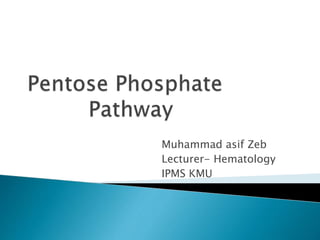
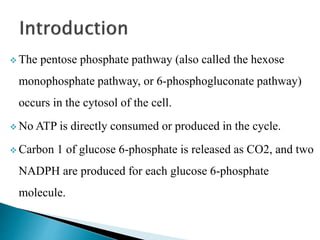

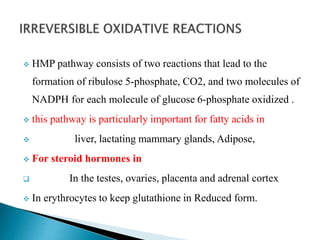
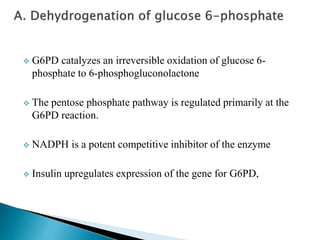
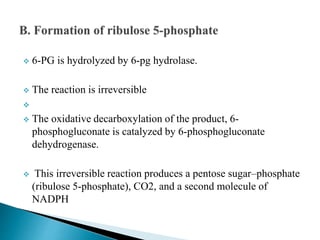
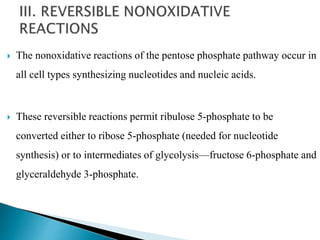
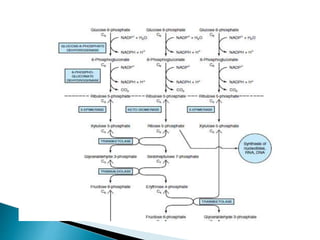
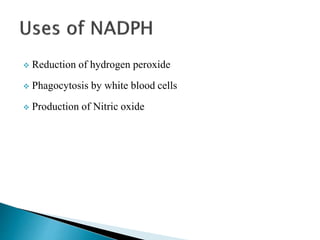
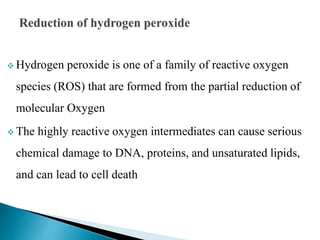
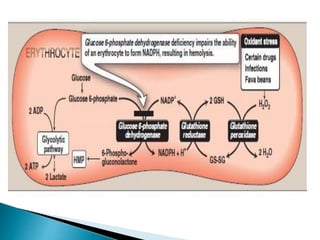
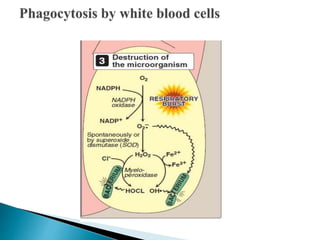
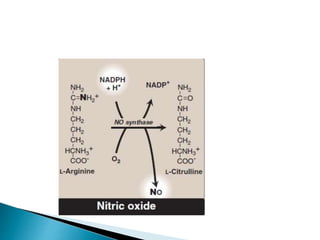
Ad
Recommended
Glycogenesis
Glycogenesis Prashant Katiyar
╠²
The document summarizes the process of glycogenesis, or the synthesis of glycogen from glucose. It involves multiple enzymatic steps: (1) glucose is converted to glucose-6-phosphate then glucose-1-phosphate, (2) UDP-glucose is synthesized from glucose-1-phosphate and UTP, (3) a small fragment of existing glycogen acts as a primer, with the initial glucose attached to glycogenin by glycogen initiator synthase, (4) glycogen synthase elongates the primer by adding glucose units with alpha-1,4 linkages, while glucosyl-4,6 transferase introduces alpha-1,6 branch linkages, building the glycogen molecule.Cyclic amp
Cyclic ampVydehi indraneel
╠²
Cyclic AMP is a second messenger that mediates hormone signaling in cells. It is synthesized from ATP by adenylate cyclase in response to hormones like epinephrine and glucagon. Cyclic AMP activates protein kinase A, which causes effects like glycogenolysis, lipolysis, modulation of gene transcription, hormone secretion, increased gastric acid secretion, and regulation of cell permeability to water.HMP Pathway- A Quick Revision
HMP Pathway- A Quick RevisionNamrata Chhabra
╠²
The hexose monophosphate shunt (HMP) pathway is an alternative pathway to glycolysis that occurs in the cytoplasm of liver, adipose tissue, and red blood cells. It has two phases: an oxidative phase that produces NADPH and a non-oxidative phase that generates pentoses and glycolytic intermediates. The HMP pathway is important because it provides NADPH for reductive biosynthesis, pentoses for nucleotide and coenzyme synthesis, and intermediates that can re-enter glycolysis or gluconeogenesis.Class 2 glycolysis
Class 2 glycolysisDhiraj Trivedi
╠²
Glycolysis is a metabolic pathway that breaks down glucose or glycogen to produce energy in the form of ATP. It can occur aerobically or anaerobically. Glycolysis involves three phases - phosphorylation, splitting of hexose sugars, and energy capture through oxidation of triose sugars. The pathway produces pyruvate or lactate as end products depending on whether oxygen is present. Glycolysis is tightly regulated at key steps and provides energy for tissues even without oxygen present through anaerobic glycolysis.Heteropolysaccharides
Heteropolysaccharides ranjani n
╠²
This document discusses heteropolysaccharides, also known as heteroglycans or glycosaminoglycans (GAGs). GAGs are polymers made from more than one type of monosaccharide or monosaccharide derivative. Examples include those found in plants like agar and pectin, and those found in humans like hyaluronic acid, chondroitin sulfate, and heparin. The document describes the composition, location, and functions of several major GAGs, including their roles in structures like the extracellular matrix, cartilage, and blood groups. Proteoglycans are also discussed, which are core proteins that have one or more GAG chains covalently attached.Glycogen metabolism
Glycogen metabolismKalaivanisathishr
╠²
This document summarizes glycogen metabolism. Glycogen is the storage form of glucose found primarily in the liver and muscles. Glycogenesis is the synthesis of glycogen from glucose using enzymes like glycogen synthase. Glycogenolysis is the breakdown of glycogen into glucose, carried out by phosphorylase and debranching enzymes. The glucose is then converted to glucose-6-phosphate and can re-enter circulation from the liver or be used locally by tissues in glycolysis. Glycogen thus serves to maintain blood glucose levels and acts as a fuel reserve for muscles.Proteoglycans
Proteoglycans Muhammadasif909
╠²
Glycoproteins and proteoglycans are important biomolecules that function in the extracellular matrix. Glycoproteins have short carbohydrate chains without repeats attached to proteins, serving roles like structure, lubrication, and cell signaling. Proteoglycans contain long repeating disaccharide units that bind large amounts of water, functioning mainly as structural components. Both are synthesized in the Golgi and degraded in lysosomes, with defects causing diseases like mucopolysaccharidoses due to glycosaminoglycan accumulation.GLYCOGENOLYSIS & REGULATION OF GLYCOGEN METABOLISM
GLYCOGENOLYSIS & REGULATION OF GLYCOGEN METABOLISMYESANNA
╠²
- Glycogenolysis is the degradation of glycogen stores in the liver and muscle into glucose. It is carried out by independent cytosolic enzymes.
- Glycogen phosphorylase breaks alpha-1,4 glycosidic bonds in glycogen, producing glucose-1-phosphate. A debranching enzyme then breaks alpha-1,6 bonds to fully degrade glycogen.
- Glucose-1-phosphate is converted to glucose-6-phosphate which can be further converted to glucose by glucose-6-phosphatase in the liver, releasing it into circulation. Muscle lacks this enzyme and uses its glucose-6-phosphate in glycolysis.
- Glycogen metabolism is regulated by hormones likeEicosanoids
EicosanoidsDipesh Tamrakar
╠²
Eicosanoids are biologically active compounds derived from arachidonic acid and play crucial roles in various physiological and pathological processes, including inflammation and smooth muscle contractions. They differ from hormones in that they are produced in small amounts in all tissues and act locally without being stored. This document outlines the classification, synthesis, functions, and clinical applications of eicosanoids, specifically focusing on prostaglandins and thromboxanes.Eicosanoid synthesis
Eicosanoid synthesisRadhakrishna Gopala Pillai
╠²
The document describes eicosanoid synthesis derived from 20-carbon fatty acids, primarily focusing on arachidonic acid as a major precursor. It details the different types of eicosanoids, such as prostaglandins and leukotrienes, their synthesis pathways, and the enzymatic processes involved in their formation. Additionally, the document discusses heme synthesis and respiratory burst mechanisms in immune cells, emphasizing the production of reactive oxygen species and their roles in defense mechanisms.Glycolysis ppt
Glycolysis pptVBCOPS
╠²
This document provides information about glycolysis, including:
1) Glycolysis involves the breakdown of glucose into pyruvate, producing 2 ATP and 2 NADH. There are 10 enzyme-catalyzed reactions in two stages.
2) Key regulatory enzymes include hexokinase, phosphofructokinase, and pyruvate kinase which control the flux of glycolysis.
3) Under anaerobic conditions, NADH is regenerated through lactic acid or ethanol fermentation to allow glycolysis to continue.Insulin Actions and Receptors
Insulin Actions and Receptors Rajendran Surendran
╠²
The document discusses insulin, its actions, receptors, and regulation. It states that insulin's main sites of action are the liver, muscle, and adipose tissue. Insulin stimulates glycogenesis, lipogenesis, and protein synthesis while inhibiting glycogenolysis, lipolysis, and protein breakdown. Insulin receptors are present on most cells, with high concentrations in the liver, muscle, and fat tissue. GLUT4 is the glucose transporter stimulated by insulin in muscle and fat tissue to increase glucose uptake.Proteoglycans
Proteoglycans Muhammadasif909
╠²
Proteoglycans are glycosylated proteins composed of a core protein bonded with glycosaminoglycan (GAG) chains, essential for hydration and structural support in connective tissues. They play diverse biological roles, such as influencing collagen fibril formation and regulating growth factors like transforming growth factor-beta. Decorin, a significant proteoglycan, participates in cell cycle regulation and inhibits angiogenesis, demonstrating its multifaceted functions in health and disease.Malfunctions of Glycolysis
Malfunctions of GlycolysisDayalbagh educational institution
╠²
Mutations in enzymes involved in glycolysis can lead to diseases. Defects in hexokinase, phosphofructokinase, aldolase, enolase and pyruvate kinase result in hemolytic anemia due to decreased ATP and 2,3-BPG levels. Symptoms include fatigue, jaundice and exercise intolerance. The diseases are typically autosomal recessive and caused by mutations inhibiting or decreasing the activity of enzymes critical to glycolysis.Fate of pyruvate - With YouTube video inside
Fate of pyruvate - With YouTube video insideKarthikeyan Pethusamy
╠²
This diagram shows the sources and fates of pyruvate in cellular metabolism. Pyruvate is produced from glucose through glycolysis and can be converted to lactic acid by lactic acid dehydrogenase (LDH) or transported into the mitochondria where it is decarboxylated to acetyl-CoA by the pyruvate dehydrogenase (PDH) complex to enter the citric acid cycle or carboxylated to oxaloacetate by pyruvate carboxylase. Pyruvate can also be reversibly interconverted with alanine and malate.Fad ŌĆō Flavin Adenine Dinucleotide
Fad ŌĆō Flavin Adenine Dinucleotiderukkurugma
╠²
Flavin adenine dinucleotide (FAD) is a coenzyme derived from riboflavin (vitamin B2) that plays a critical role in oxidation and reduction reactions, existing in three redox states: oxidized, half-reduced, and fully reduced. FAD is biosynthesized from riboflavin through two key enzymatic steps and functions as a crucial cofactor in various metabolic pathways, including ATP production and amino acid catabolism. Humans must obtain riboflavin through diet, as they can no longer synthesize it, unlike certain bacteria, fungi, and plants.Sphingolipids
SphingolipidsAndres mu?z
╠²
Sphingolipids are a class of lipids that include sphingomyelin, glycosphingolipids, and ceramide. They serve important structural and signaling functions in the cell membrane and participate in processes like cell growth, differentiation, and apoptosis. Sphingolipids are synthesized through de novo pathways or through the breakdown of sphingomyelin. Their metabolites, including ceramide, sphingosine-1-phosphate, and gangliosides act as second messengers and influence pathways such as PI3K/Akt and JNK. Sphingolipids are also components of lipid rafts and caveolae, which regulate protein activity and cellular signaling. Imbalances in sphGlycogenesis ---Sir Khalid (Biochem)
Glycogenesis ---Sir Khalid (Biochem)Soft-Learners
╠²
This document discusses glycogenesis and glycogenolysis. Glycogenesis is the process by which glucose is polymerized into glycogen in the liver and skeletal muscles. It involves phosphorylation of glucose, synthesis of UDP-glucose, addition of glucose units to glycogen by glycogen synthase, and branching of glycogen chains. Glycogenolysis is the breakdown of glycogen into glucose-1-phosphate. It involves cleavage of glycosidic bonds by glycogen phosphorylase and debranching enzyme. Glycogen levels are regulated by hormones like epinephrine, glucagon, and insulin which target glycogen phosphorylase and glycogen synthase.Metabolism of glycogen
Metabolism of glycogenAshok Katta
╠²
Glycogen is the major storage form of glucose found mainly in the liver and skeletal muscles. It is formed from glucose through glycogenesis and broken down into glucose through glycogenolysis. These pathways are regulated by enzymes like glycogen synthase and glycogen phosphorylase in response to hormones like insulin and glucagon to maintain blood glucose levels. Deficiencies in enzymes of glycogen metabolism can result in glycogen storage diseases characterized by hypoglycemia, hepatomegaly and other symptoms.Glycine
GlycineDr.M.Prasad Naidu
╠²
Glycine is the simplest amino acid. It has several metabolic functions including the biosynthesis of heme, purines, creatine, glutathione, and as a conjugating agent. Glycine is also used as a neurotransmitter in the brainstem and spinal cord and is a constituent of proteins, often found where the polypeptide chain bends or turns. Key reactions involving glycine include its role in the rate-limiting step of heme synthesis through ALA synthase, incorporation into the purine ring, and synthesis of creatine through combination with arginine and subsequent phosphorylation. Glycine also functions in glutathione synthesis, free radical scavenging, amino acid transport, insulin inactivation, and enzyme activation through thiol groupsCarbohydrate metabolism
Carbohydrate metabolismSaniyaMulani1
╠²
This document summarizes several pathways involved in carbohydrate metabolism. It describes the hexose monophosphate pathway (HMP pathway), which provides an alternative route for glucose metabolism and is significant for biosynthesis of NADPH and pentose sugars. It does not consume or produce ATP. The document also summarizes the gamma amino butyrate (GABA) shunt, which converts glutamate to succinate via GABA. Finally, it provides an overview of glycogen metabolism, describing glycogen synthesis from glucose and glycogen breakdown into glucose.Insulin, glucagon & dm
Insulin, glucagon & dmDrChintansinh Parmar
╠²
The document discusses the pancreas, insulin, glucagon, and diabetes mellitus. The pancreas has both digestive and endocrine functions. Its islets of Langerhans secrete insulin and glucagon directly into the bloodstream. Insulin regulates carbohydrate, fat, and protein metabolism, promoting storage of glucose and fatty acids. Glucagon increases blood glucose levels through glycogenolysis and gluconeogenesis. Diabetes mellitus occurs when insulin secretion is impaired (type 1) or tissues are resistant to insulin (type 2), leading to high blood glucose levels and various complications if not controlled.Metabolism of phospholipids
Metabolism of phospholipidsRamesh Gupta
╠²
This document summarizes metabolism and synthesis of phospholipids. It discusses that phospholipids include glycerophospholipids containing glycerol and sphingophospholipids containing sphingosine. The major glycerophospholipids synthesized include phosphatidylcholine, phosphatidylethanolamine, phosphatidylinositol, and phosphatidylserine. Sphingomyelin is the major sphingophospholipid found in the myelin sheath. Phospholipids form bilayers that constitute cell membranes. Their synthesis involves activated intermediates like CDP-choline and CDP-ethanolamine reacting with diacylglycerol. PhGlycoproteins
Glycoproteins Dr. Kapil Dev Doddamani
╠²
- Glycoproteins are proteins that contain oligosaccharide chains covalently attached to their polypeptide backbones. They serve important biological roles.
- There are two main classes of glycoproteins: O-linked, where sugars attach to serine or threonine residues, and N-linked, where sugars attach to asparagine residues.
- Diseases can result from defects in glycoprotein biosynthesis, such as I-cell disease caused by a defect in N-linked glycosylation and congenital disorders of glycosylation caused by various defects impacting O-linked or N-linked glycosylation.Ecosinoid metabolism
Ecosinoid metabolismDr.M.Prasad Naidu
╠²
This document discusses the metabolism of unsaturated fatty acids and eicosanoids. It notes that animals have limited ability to desaturate fatty acids and require certain polyunsaturated fatty acids from plants. These essential fatty acids give rise to eicosanoic acids that produce eicosanoids like prostaglandins and leukotrienes. The metabolism of unsaturated fatty acids involves desaturase and elongase enzyme systems. Deficiencies in essential fatty acids can cause growth and reproductive issues in rats.Hormonal regulation of Blood glucose (diabetes mellitus)
Hormonal regulation of Blood glucose (diabetes mellitus)ssrajendranrvs
╠²
This document discusses the hormonal regulation of blood glucose levels. It outlines several hormones that increase blood glucose, including glucagon, epinephrine, cortisol, ACTH, growth hormone, and thyroxine. These hormones cause the liver to produce glucose or break down glycogen and fat stores to release glucose. Insulin and somatostatin decrease blood glucose by promoting the uptake of glucose from the bloodstream into cells and suppressing glucagon secretion. The pancreas, adrenal glands, pituitary gland, and thyroid gland all secrete hormones that work together to maintain blood glucose homeostasis.Chapter 2 (1).pptx
Chapter 2 (1).pptxMohamedRashadSalamaE
╠²
The document summarizes the metabolic fates of amino acid carbon skeletons after removal of the amino group by transamination or deamination. It states that the carbon skeletons (╬▒-keto acids) can undergo reamination to reform the amino acid or catabolism to form seven intermediates - pyruvate, acetyl CoA, acetoacetyl CoA, fumarate, oxaloacetate, ╬▒-ketoglutarate, and succinyl CoA - which then enter pathways to synthesize glucose, lipids, or undergo complete oxidation in the Krebs cycle. It further classifies amino acids based on their degradation products and discusses the metabolic pathways of individual amino acids.Pentose phosphate pathway,hmp shunt
Pentose phosphate pathway,hmp shuntSchool of Biosciences, MACFAST College, Tiruvalla, Kerala, India
╠²
The pentose phosphate pathway (PPP), also known as the hexose monophosphate shunt (HMP) or phosphogluconate pathway, is an alternative glucose metabolism pathway to glycolysis. It is more complex than glycolysis and takes place in the cytosol. The PPP is important for generating NADPH for biosynthesis of fatty acids, steriods, and maintaining glutathione levels, as well as producing pentoses used in nucleic acid synthesis. The pathway contains oxidative and non-oxidative phases, with glucose-6-phosphate dehydrogenase and 6-phosphogluconate dehydrogenase being the regulatory enzymes controlled by NADPH and pentose levels.Hmp shunt
Hmp shunt Kareen Al Machzain
╠²
Glucose-6-phosphate acts as a branch point for several metabolic pathways. It can be used for glycolysis, glycogen synthesis, the hexose monophosphate shunt, and gluconeogenesis. The hexose monophosphate shunt generates NADPH for biosynthetic reactions through glucose-6-phosphate dehydrogenase and 6-phosphogluconate dehydrogenase. NADPH is required for processes like fatty acid synthesis, cholesterol synthesis, and maintaining reduced glutathione levels in red blood cells. Glucose-6-phosphate dehydrogenase deficiency, which reduces NADPH production, provides some protection against malaria by shortening red blood cell lifespan.Pentose Phosphate Pathway (Hexose Monophosphate Shunt)
Pentose Phosphate Pathway (Hexose Monophosphate Shunt)Hamid Ur-Rahman
╠²
The pentose phosphate pathway generates NADPH and ribose-5-phosphate. It occurs in the cytosol in two phases: an oxidative phase that produces NADPH and ribose-5-phosphate from glucose-6-phosphate, and a non-oxidative reversible phase. NADPH is used to produce fatty acids, amino acids, and reduced glutathione which protects cells from reactive oxygen species. A deficiency in glucose-6-phosphate dehydrogenase, which produces the first NADPH, can cause hemolytic anemia due to increased oxidative damage from a lack of protection against reactive oxygen species. The pathway is regulated by NADPH levels, with more NADPH production when NADPH is used in other pathwaysMore Related Content
What's hot (20)
Eicosanoids
EicosanoidsDipesh Tamrakar
╠²
Eicosanoids are biologically active compounds derived from arachidonic acid and play crucial roles in various physiological and pathological processes, including inflammation and smooth muscle contractions. They differ from hormones in that they are produced in small amounts in all tissues and act locally without being stored. This document outlines the classification, synthesis, functions, and clinical applications of eicosanoids, specifically focusing on prostaglandins and thromboxanes.Eicosanoid synthesis
Eicosanoid synthesisRadhakrishna Gopala Pillai
╠²
The document describes eicosanoid synthesis derived from 20-carbon fatty acids, primarily focusing on arachidonic acid as a major precursor. It details the different types of eicosanoids, such as prostaglandins and leukotrienes, their synthesis pathways, and the enzymatic processes involved in their formation. Additionally, the document discusses heme synthesis and respiratory burst mechanisms in immune cells, emphasizing the production of reactive oxygen species and their roles in defense mechanisms.Glycolysis ppt
Glycolysis pptVBCOPS
╠²
This document provides information about glycolysis, including:
1) Glycolysis involves the breakdown of glucose into pyruvate, producing 2 ATP and 2 NADH. There are 10 enzyme-catalyzed reactions in two stages.
2) Key regulatory enzymes include hexokinase, phosphofructokinase, and pyruvate kinase which control the flux of glycolysis.
3) Under anaerobic conditions, NADH is regenerated through lactic acid or ethanol fermentation to allow glycolysis to continue.Insulin Actions and Receptors
Insulin Actions and Receptors Rajendran Surendran
╠²
The document discusses insulin, its actions, receptors, and regulation. It states that insulin's main sites of action are the liver, muscle, and adipose tissue. Insulin stimulates glycogenesis, lipogenesis, and protein synthesis while inhibiting glycogenolysis, lipolysis, and protein breakdown. Insulin receptors are present on most cells, with high concentrations in the liver, muscle, and fat tissue. GLUT4 is the glucose transporter stimulated by insulin in muscle and fat tissue to increase glucose uptake.Proteoglycans
Proteoglycans Muhammadasif909
╠²
Proteoglycans are glycosylated proteins composed of a core protein bonded with glycosaminoglycan (GAG) chains, essential for hydration and structural support in connective tissues. They play diverse biological roles, such as influencing collagen fibril formation and regulating growth factors like transforming growth factor-beta. Decorin, a significant proteoglycan, participates in cell cycle regulation and inhibits angiogenesis, demonstrating its multifaceted functions in health and disease.Malfunctions of Glycolysis
Malfunctions of GlycolysisDayalbagh educational institution
╠²
Mutations in enzymes involved in glycolysis can lead to diseases. Defects in hexokinase, phosphofructokinase, aldolase, enolase and pyruvate kinase result in hemolytic anemia due to decreased ATP and 2,3-BPG levels. Symptoms include fatigue, jaundice and exercise intolerance. The diseases are typically autosomal recessive and caused by mutations inhibiting or decreasing the activity of enzymes critical to glycolysis.Fate of pyruvate - With YouTube video inside
Fate of pyruvate - With YouTube video insideKarthikeyan Pethusamy
╠²
This diagram shows the sources and fates of pyruvate in cellular metabolism. Pyruvate is produced from glucose through glycolysis and can be converted to lactic acid by lactic acid dehydrogenase (LDH) or transported into the mitochondria where it is decarboxylated to acetyl-CoA by the pyruvate dehydrogenase (PDH) complex to enter the citric acid cycle or carboxylated to oxaloacetate by pyruvate carboxylase. Pyruvate can also be reversibly interconverted with alanine and malate.Fad ŌĆō Flavin Adenine Dinucleotide
Fad ŌĆō Flavin Adenine Dinucleotiderukkurugma
╠²
Flavin adenine dinucleotide (FAD) is a coenzyme derived from riboflavin (vitamin B2) that plays a critical role in oxidation and reduction reactions, existing in three redox states: oxidized, half-reduced, and fully reduced. FAD is biosynthesized from riboflavin through two key enzymatic steps and functions as a crucial cofactor in various metabolic pathways, including ATP production and amino acid catabolism. Humans must obtain riboflavin through diet, as they can no longer synthesize it, unlike certain bacteria, fungi, and plants.Sphingolipids
SphingolipidsAndres mu?z
╠²
Sphingolipids are a class of lipids that include sphingomyelin, glycosphingolipids, and ceramide. They serve important structural and signaling functions in the cell membrane and participate in processes like cell growth, differentiation, and apoptosis. Sphingolipids are synthesized through de novo pathways or through the breakdown of sphingomyelin. Their metabolites, including ceramide, sphingosine-1-phosphate, and gangliosides act as second messengers and influence pathways such as PI3K/Akt and JNK. Sphingolipids are also components of lipid rafts and caveolae, which regulate protein activity and cellular signaling. Imbalances in sphGlycogenesis ---Sir Khalid (Biochem)
Glycogenesis ---Sir Khalid (Biochem)Soft-Learners
╠²
This document discusses glycogenesis and glycogenolysis. Glycogenesis is the process by which glucose is polymerized into glycogen in the liver and skeletal muscles. It involves phosphorylation of glucose, synthesis of UDP-glucose, addition of glucose units to glycogen by glycogen synthase, and branching of glycogen chains. Glycogenolysis is the breakdown of glycogen into glucose-1-phosphate. It involves cleavage of glycosidic bonds by glycogen phosphorylase and debranching enzyme. Glycogen levels are regulated by hormones like epinephrine, glucagon, and insulin which target glycogen phosphorylase and glycogen synthase.Metabolism of glycogen
Metabolism of glycogenAshok Katta
╠²
Glycogen is the major storage form of glucose found mainly in the liver and skeletal muscles. It is formed from glucose through glycogenesis and broken down into glucose through glycogenolysis. These pathways are regulated by enzymes like glycogen synthase and glycogen phosphorylase in response to hormones like insulin and glucagon to maintain blood glucose levels. Deficiencies in enzymes of glycogen metabolism can result in glycogen storage diseases characterized by hypoglycemia, hepatomegaly and other symptoms.Glycine
GlycineDr.M.Prasad Naidu
╠²
Glycine is the simplest amino acid. It has several metabolic functions including the biosynthesis of heme, purines, creatine, glutathione, and as a conjugating agent. Glycine is also used as a neurotransmitter in the brainstem and spinal cord and is a constituent of proteins, often found where the polypeptide chain bends or turns. Key reactions involving glycine include its role in the rate-limiting step of heme synthesis through ALA synthase, incorporation into the purine ring, and synthesis of creatine through combination with arginine and subsequent phosphorylation. Glycine also functions in glutathione synthesis, free radical scavenging, amino acid transport, insulin inactivation, and enzyme activation through thiol groupsCarbohydrate metabolism
Carbohydrate metabolismSaniyaMulani1
╠²
This document summarizes several pathways involved in carbohydrate metabolism. It describes the hexose monophosphate pathway (HMP pathway), which provides an alternative route for glucose metabolism and is significant for biosynthesis of NADPH and pentose sugars. It does not consume or produce ATP. The document also summarizes the gamma amino butyrate (GABA) shunt, which converts glutamate to succinate via GABA. Finally, it provides an overview of glycogen metabolism, describing glycogen synthesis from glucose and glycogen breakdown into glucose.Insulin, glucagon & dm
Insulin, glucagon & dmDrChintansinh Parmar
╠²
The document discusses the pancreas, insulin, glucagon, and diabetes mellitus. The pancreas has both digestive and endocrine functions. Its islets of Langerhans secrete insulin and glucagon directly into the bloodstream. Insulin regulates carbohydrate, fat, and protein metabolism, promoting storage of glucose and fatty acids. Glucagon increases blood glucose levels through glycogenolysis and gluconeogenesis. Diabetes mellitus occurs when insulin secretion is impaired (type 1) or tissues are resistant to insulin (type 2), leading to high blood glucose levels and various complications if not controlled.Metabolism of phospholipids
Metabolism of phospholipidsRamesh Gupta
╠²
This document summarizes metabolism and synthesis of phospholipids. It discusses that phospholipids include glycerophospholipids containing glycerol and sphingophospholipids containing sphingosine. The major glycerophospholipids synthesized include phosphatidylcholine, phosphatidylethanolamine, phosphatidylinositol, and phosphatidylserine. Sphingomyelin is the major sphingophospholipid found in the myelin sheath. Phospholipids form bilayers that constitute cell membranes. Their synthesis involves activated intermediates like CDP-choline and CDP-ethanolamine reacting with diacylglycerol. PhGlycoproteins
Glycoproteins Dr. Kapil Dev Doddamani
╠²
- Glycoproteins are proteins that contain oligosaccharide chains covalently attached to their polypeptide backbones. They serve important biological roles.
- There are two main classes of glycoproteins: O-linked, where sugars attach to serine or threonine residues, and N-linked, where sugars attach to asparagine residues.
- Diseases can result from defects in glycoprotein biosynthesis, such as I-cell disease caused by a defect in N-linked glycosylation and congenital disorders of glycosylation caused by various defects impacting O-linked or N-linked glycosylation.Ecosinoid metabolism
Ecosinoid metabolismDr.M.Prasad Naidu
╠²
This document discusses the metabolism of unsaturated fatty acids and eicosanoids. It notes that animals have limited ability to desaturate fatty acids and require certain polyunsaturated fatty acids from plants. These essential fatty acids give rise to eicosanoic acids that produce eicosanoids like prostaglandins and leukotrienes. The metabolism of unsaturated fatty acids involves desaturase and elongase enzyme systems. Deficiencies in essential fatty acids can cause growth and reproductive issues in rats.Hormonal regulation of Blood glucose (diabetes mellitus)
Hormonal regulation of Blood glucose (diabetes mellitus)ssrajendranrvs
╠²
This document discusses the hormonal regulation of blood glucose levels. It outlines several hormones that increase blood glucose, including glucagon, epinephrine, cortisol, ACTH, growth hormone, and thyroxine. These hormones cause the liver to produce glucose or break down glycogen and fat stores to release glucose. Insulin and somatostatin decrease blood glucose by promoting the uptake of glucose from the bloodstream into cells and suppressing glucagon secretion. The pancreas, adrenal glands, pituitary gland, and thyroid gland all secrete hormones that work together to maintain blood glucose homeostasis.Chapter 2 (1).pptx
Chapter 2 (1).pptxMohamedRashadSalamaE
╠²
The document summarizes the metabolic fates of amino acid carbon skeletons after removal of the amino group by transamination or deamination. It states that the carbon skeletons (╬▒-keto acids) can undergo reamination to reform the amino acid or catabolism to form seven intermediates - pyruvate, acetyl CoA, acetoacetyl CoA, fumarate, oxaloacetate, ╬▒-ketoglutarate, and succinyl CoA - which then enter pathways to synthesize glucose, lipids, or undergo complete oxidation in the Krebs cycle. It further classifies amino acids based on their degradation products and discusses the metabolic pathways of individual amino acids.Pentose phosphate pathway,hmp shunt
Pentose phosphate pathway,hmp shuntSchool of Biosciences, MACFAST College, Tiruvalla, Kerala, India
╠²
The pentose phosphate pathway (PPP), also known as the hexose monophosphate shunt (HMP) or phosphogluconate pathway, is an alternative glucose metabolism pathway to glycolysis. It is more complex than glycolysis and takes place in the cytosol. The PPP is important for generating NADPH for biosynthesis of fatty acids, steriods, and maintaining glutathione levels, as well as producing pentoses used in nucleic acid synthesis. The pathway contains oxidative and non-oxidative phases, with glucose-6-phosphate dehydrogenase and 6-phosphogluconate dehydrogenase being the regulatory enzymes controlled by NADPH and pentose levels.Similar to Hmp shunt pathway (20)
Hmp shunt
Hmp shunt Kareen Al Machzain
╠²
Glucose-6-phosphate acts as a branch point for several metabolic pathways. It can be used for glycolysis, glycogen synthesis, the hexose monophosphate shunt, and gluconeogenesis. The hexose monophosphate shunt generates NADPH for biosynthetic reactions through glucose-6-phosphate dehydrogenase and 6-phosphogluconate dehydrogenase. NADPH is required for processes like fatty acid synthesis, cholesterol synthesis, and maintaining reduced glutathione levels in red blood cells. Glucose-6-phosphate dehydrogenase deficiency, which reduces NADPH production, provides some protection against malaria by shortening red blood cell lifespan.Pentose Phosphate Pathway (Hexose Monophosphate Shunt)
Pentose Phosphate Pathway (Hexose Monophosphate Shunt)Hamid Ur-Rahman
╠²
The pentose phosphate pathway generates NADPH and ribose-5-phosphate. It occurs in the cytosol in two phases: an oxidative phase that produces NADPH and ribose-5-phosphate from glucose-6-phosphate, and a non-oxidative reversible phase. NADPH is used to produce fatty acids, amino acids, and reduced glutathione which protects cells from reactive oxygen species. A deficiency in glucose-6-phosphate dehydrogenase, which produces the first NADPH, can cause hemolytic anemia due to increased oxidative damage from a lack of protection against reactive oxygen species. The pathway is regulated by NADPH levels, with more NADPH production when NADPH is used in other pathwaysCOG PENTOSE PHOSPHATE PATHWAY.p khztbhpt
COG PENTOSE PHOSPHATE PATHWAY.p khztbhptmbashapatrick09
╠²
The pentose phosphate pathway (PPP) is an alternative glucose oxidation route that generates NADPH and ribose 5-phosphate, essential for nucleotide synthesis and various anabolic reactions. It consists of two phases: an oxidative phase that produces NADPH and a non-oxidative phase that interconverts sugars. Glucose-6-phosphate dehydrogenase (G6PD) is crucial for this pathway, and its deficiency can lead to hemolytic anemia due to inadequate NADPH and glutathione levels, making erythrocytes susceptible to oxidative damage.10 carbohydrate Metabolism for medical students
10 carbohydrate Metabolism for medical studentsabdurrahmanahmad600
╠²
The document outlines two metabolic pathways: the uronic acid pathway, which synthesizes UDP-glucuronic acid and is involved in vitamin C production, and the pentose phosphate pathway (HMP), which generates NADPH and pentoses for nucleic acid synthesis. It also addresses disorders related to these pathways, such as essential pentosuria and glucose-6-phosphate dehydrogenase deficiency, and their implications on health. Additionally, the significance of NADPH in various biological processes, including drug detoxification and redox balance, is emphasized.Hmp shunt
Hmp shuntOPTOM FASLU MUHAMMED
╠²
The pentose phosphate pathway generates NADPH and ribose-5-phosphate. NADPH is important for protecting cells against reactive oxygen species through its role in reducing glutathione. The pathway occurs in two phases - an oxidative phase that produces ribose-5-phosphate and NADPH, and a non-oxidative phase that recycles pentose phosphates. A defect in glucose-6-phosphate dehydrogenase can cause hemolytic anemia by impairing the production of NADPH and the ability to detoxify reactive oxygen species. The entry of glucose-6-phosphate into the pathway is regulated by NADPH levels.BIOCHEMISTRY.xnnxjxjxjdjdjdjjdjdjdjdpptx
BIOCHEMISTRY.xnnxjxjxjdjdjdjjdjdjdjdpptxMEGLADON2
╠²
The pentose phosphate pathway (PPP) is a multicyclic process occurring in the cytosol, divided into an oxidative phase that generates NADPH and a non-oxidative phase for interconversion of sugars, playing a crucial role in nucleotide biosynthesis. Glucose-6-phosphate dehydrogenase (G-6-PD) is the rate-limiting enzyme, and its activity is regulated by NADPH levels; deficiencies in G-6-PD can lead to hemolytic anemia but also provide resistance to malaria. Additionally, the Wernicke-Korsakoff syndrome is associated with reduced transketolase activity due to chronic thiamine deficiency.BIOCHEMISTRY.xnnxjxjxjdjdjdjjdjdjdjdpptx
BIOCHEMISTRY.xnnxjxjxjdjdjdjjdjdjdjdpptxMEGLADON2
╠²
The pentose phosphate pathway (PPP) is a multicyclic process occurring in the cytosol, divided into an oxidative phase that generates NADPH and a non-oxidative phase for interconversion of sugars, playing a crucial role in nucleotide biosynthesis. Glucose-6-phosphate dehydrogenase (G-6-PD) is the rate-limiting enzyme, and its activity is regulated by NADPH levels; deficiencies in G-6-PD can lead to hemolytic anemia but also provide resistance to malaria. Additionally, the Wernicke-Korsakoff syndrome is associated with reduced transketolase activity due to chronic thiamine deficiency.The pentose phosphate pathway
The pentose phosphate pathwayFarhana Atia
╠²
The document summarizes the pentose phosphate pathway (PPP), an alternative glucose metabolism pathway that generates reducing power in the form of NADPH and pentoses for nucleotide synthesis. The PPP occurs in the cytoplasm of most tissues and has two phases: an oxidative phase that irreversibly generates NADPH and a non-oxidative phase that reversibly produces pentoses. A key importance is providing NADPH for fatty acid synthesis and antioxidant defenses. Deficiencies in the PPP can cause hemolytic anemia due to oxidative damage from hydrogen peroxide accumulation. hmp-shunt
hmp-shuntDivya Sharma
╠²
The hexose monophosphate (HMP) pathway, also known as the pentose phosphate pathway or PP pathway, functions to produce NADPH and ribose-5-phosphate. It occurs in the cytoplasm and is divided into oxidative and non-oxidative phases. The oxidative phase produces NADPH through irreversible reactions, while the non-oxidative phase produces ribose-5-phosphate through reversible reactions. NADPH is important for reducing glutathione and eliminating hydrogen peroxide, while ribose-5-phosphate contributes to nucleic acid synthesis. Deficiencies in glucose-6-phosphate dehydrogenase, an enzyme in the oxidative phase of the HMP pathway, can cause hemolytic anemia by inhibiting the productionPentose Phosphate Pathway
Pentose Phosphate PathwayAyesha MohayudDin
╠²
The pentose phosphate pathway (PPP), also known as the phosphogluconate pathway or hexose monophosphate shunt, is a metabolic pathway that generates NADPH and pentoses through the oxidation of glucose-6-phosphate. It occurs in the cytoplasm and is important for producing ribose-5-phosphate for nucleotide biosynthesis and NADPH for reductive biosynthesis and protecting against oxidative stress. The pathway consists of an oxidative phase that produces NADPH and a non-oxidative phase involving sugar interconversions.HMP PATHWAY
HMP PATHWAY JubsShrestha
╠²
The hexose monophosphate pathway (HMP), also known as the pentose phosphate pathway, is an alternative to glycolysis focused on the production of NADPH and pentoses which are vital for biosynthetic processes including fatty acid and nucleotide synthesis. It consists of an oxidative phase that generates NADPH and a non-oxidative phase that interconverts sugar phosphates, producing intermediates for glycolysis and nucleotide synthesis. The pathway is crucial for cells lacking mitochondria, providing reducing power and addressing oxidative stress, particularly in erythrocytes.Hexose monophosphate pathway/Pentose phosphate pathway.pptx
Hexose monophosphate pathway/Pentose phosphate pathway.pptxmohammed959032
╠²
The pentose phosphate pathway generates NADPH and ribose-5-phosphate. It consists of oxidative and nonoxidative phases. The oxidative phase generates NADPH through glucose-6-phosphate dehydrogenase in an irreversible reaction. NADPH is used for biosynthetic reactions requiring a reducing agent. The nonoxidative phase rearranges carbon atoms to regenerate glycolytic intermediates. The pathway is important where NADPH production is needed, like fatty acid synthesis in the liver. Glucose-6-phosphate dehydrogenase deficiency can cause hemolytic anemia upon exposure to oxidizing drugs due to impaired NADPH production.Hmp shunt
Hmp shuntStanz Ng
╠²
Glucose-6-phosphate acts as a branch point for several metabolic pathways. It can be used for glycolysis, glycogen synthesis, the hexose monophosphate shunt, and gluconeogenesis. The hexose monophosphate shunt produces NADPH and ribose-5-phosphate. NADPH is used for biosynthetic reactions like fatty acid synthesis. Ribose-5-phosphate is used for nucleotide synthesis. The pathway involves glucose-6-phosphate dehydrogenase and 6-phosphogluconate dehydrogenase which generate NADPH in irreversible steps. Later reversible steps interconvert pentose phosphates to regenerate pathway intermediates.PENTOSE PHOSPHATE PATHWAY
PENTOSE PHOSPHATE PATHWAYRabia Khan Baber
╠²
The document outlines the two major phases of the pentose phosphate pathway: oxidative and non-oxidative. The oxidative phase generates NADPH vital for various biosynthetic processes, while the non-oxidative phase produces 5-carbon sugars for nucleotide and amino acid synthesis. Overall, the pentose phosphate pathway serves as an alternative to glycolysis and plays a crucial role in cellular metabolism, particularly in tissues like the liver and adipose tissue.Glycolysis
GlycolysisStanz Ng
╠²
This document summarizes glycolysis, the metabolic pathway that converts glucose into pyruvate. It describes the two phases of glycolysis - the preparatory phase which requires ATP, and the payoff phase which yields ATP and NADH. It also lists the three possible fates of the pyruvate produced: lactic acid fermentation, ethanol fermentation, or further processing in the citric acid cycle.MONOPHOSPHATE-SHUNT-OVERVIEW-GROUP-7.pptx
MONOPHOSPHATE-SHUNT-OVERVIEW-GROUP-7.pptxJaneSisterway
╠²
The monophosphate shunt, also known as the pentose phosphate pathway (PPP) or hexose monophosphate shunt (HMP shunt), is a metabolic pathway that runs parallel to glycolysis. It plays a crucial role in generating NADPH, which is essential for reductive biosynthesis and protection against oxidative stress, and ribose-5-phosphate, a precursor for nucleotide synthesisHMP Shunt
HMP ShuntBiochemistrySGRDIMSAR
╠²
The document summarizes key aspects of the hexose monophosphate pathway (HMP pathway or pentose phosphate pathway). It describes the pathway's location in the cytosol and key tissues where it is active. The oxidative and non-oxidative phases of the pathway and their reactions are outlined. Regulation of the pathway by NADPH concentration is mentioned. The significance of the pathway is that it generates pentoses and NADPH, which is important for biosynthesis and antioxidant reactions. Deficiencies in the pathway can cause hemolytic anemia.2.2 pentose and uronic pathway.pptx
2.2 pentose and uronic pathway.pptxFatima117039
╠²
The pentose phosphate pathway generates NADPH and ribose-5-phosphate. It consists of oxidative and nonoxidative phases. The oxidative phase generates NADPH through glucose-6-phosphate dehydrogenase in an irreversible reaction. No ATP is directly produced or consumed. The nonoxidative phase rearranges carbon atoms through transketolase and transaldolase, linking back to glycolysis. NADPH is used for biosynthesis like fatty acids and glutathione regeneration, while ribose-5-phosphate is used for nucleotides. Glucose-6-phosphate dehydrogenase regulates flux and is feedback inhibited by NADPH. Deficiencies can cause hemolytic anemia upon exposure to oxidizing drugs or foods like fHMP shunt
HMP shuntabdulrahman amer
╠²
The pentose phosphate pathway generates NADPH and pentose sugars. It has both an oxidative and non-oxidative phase. In the oxidative phase, glucose-6-phosphate is oxidized to produce NADPH. In the non-oxidative phase, 5-carbon sugars are converted into 3 and 6 carbon sugars through a series of isomerization, epimerization, and transketolase reactions. The pathway is important as it provides NADPH for biosynthetic reactions and pentose sugars for nucleotide synthesis. A defect in glucose-6-phosphate dehydrogenase can lead to insufficient NADPH and glutathione, resulting in hemolytic anemia due to oxidative damage of red blood cells.chapter -5.pptx presentation of intermediated metabolism
chapter -5.pptx presentation of intermediated metabolismmuskannshaikh8152004
╠²
The pentose phosphate pathway (PPP) is an alternate route for glucose oxidation that generates NADPH and ribose-5-phosphate, crucial for fatty acid and nucleic acid synthesis. It operates in two phases: an irreversible oxidative phase that produces NADPH and a reversible non-oxidative phase that interconverts various sugars. The pathway is particularly active in tissues with high proliferation and lipid synthesis but less active in skeletal muscle and non-lactating mammary glands.Ad
Recently uploaded (20)
Clinical Signs Overview: PICCKLE Mnemonic
Clinical Signs Overview: PICCKLE MnemonicDr Aman Suresh Tharayil
╠²
This presentation provides a concise yet comprehensive review of common clinical signs and their diagnostic significance, summarized under the acronym PICCKLE ŌĆō Pallor, Icterus, Clubbing, Cyanosis, Koilonychia, Lymphadenopathy, and Edema. Each condition is defined, followed by key causes, pathophysiology, diagnostic techniques, and clinical relevance. The content is tailored for undergraduate and postgraduate students in medicine and pharmacy, as well as early-career clinicians seeking to reinforce their clinical examination skills5-Lift Analysis in ergonomics focuses on evaluating the safety and efficienc...
5-Lift Analysis in ergonomics focuses on evaluating the safety and efficienc...Bolan University of Medical and Health Sciences ,Quetta
╠²
Lift Analysis in ergonomics focuses on evaluating the safety and efficiency of manual lifting tasks in the workplace. It involves assessing the physical demands placed on the human body during lifting activities to prevent musculoskeletal disorders (MSDs), particularly lower back injuriesComputer aided formulation development optimization
Computer aided formulation development optimizationSwami ramanand teerth marathwada university
╠²
Concept of optimization, optimization parameters, factorial design, optimization technology & screening design. Aspirin powder or Acetyl salicylic acid powder.docx
Aspirin powder or Acetyl salicylic acid powder.docxkopalsharma85
╠²
pharmacy exercise on aspirin powderAn interesting case of facial Swelling in an autoimmune rheumatic disease Ahm...
An interesting case of facial Swelling in an autoimmune rheumatic disease Ahm...Internal medicine department, faculty of Medicine Beni-Suef University Egypt
╠²
An interesting case of facial Swelling in an autoimmune rheumatic disease Ahmed Yehia EGYSIR Conference Coarse Dispersion, Physical Pharmaceutics
Coarse Dispersion, Physical Pharmaceuticsnishiprakashj
╠²
Its a compilation of unit 3 as per PCI syllabus of B.Pharm IV sem, Subject Physical Pharmaceutics.JUNE 2025 ONCOLOGY CARTOONS BY DR KANHU CHARAN PATRO
JUNE 2025 ONCOLOGY CARTOONS BY DR KANHU CHARAN PATROKanhu Charan
╠²
JUNE 2025 ONCOLOGY CARTOONS BY DR KANHU CHARAN PATROMindfull Midwives: MENTAL WELLBEING OF MIDWIVES FOR BETTER FOR RESPECTFUL MAT...
Mindfull Midwives: MENTAL WELLBEING OF MIDWIVES FOR BETTER FOR RESPECTFUL MAT...LaxmiDeshpande6
╠²
Midwifery practioners should be mindful while caring of mother at all stages like antenatal, postnatal ,during delivery , care of baby.Biography and Professional Career of Dr. Seth Eidemiller
Biography and Professional Career of Dr. Seth EidemillerDr. Seth Eidemiller
╠²
Dr. Seth A. Eidemiller is a board-certified emergency physician whose professional journey began on a fourth-generation dairy farm in Idaho. Early on, he gained experience through farming, wildfire suppression, and construction work, which gave him a strong foundation in practical skills and resilience. After completing degrees in International Studies and Spanish, he returned to Boise to fulfill the prerequisites for medical school and study laboratory sciences. He then attended the University of Nevada, Reno School of Medicine, and continued his training with a residency in emergency medicine in Fresno. Today, he serves as Vice Chair of the Chico Emergency Medicine Physician Group.From Preservation To Regeneration--The Stem Cell Era of Hair Restoration_DrAl...
From Preservation To Regeneration--The Stem Cell Era of Hair Restoration_DrAl...Alan Bauman
╠²
How can the latest in Regenerative Medicine help those suffering from hair loss? Cell Surgical Conference 2025 featured Dr Alan Bauman as a faculty member once again to discuss all things related to hair loss, hair transplantation and the use of regenerative stem cell therapies for hair restoration. HEALTH CARE PLANNING AND ORGANIZATION OF HEALTH CARE
HEALTH CARE PLANNING AND ORGANIZATION OF HEALTH CAREnawaabaquib
╠²
This PowerPoint presentation covers Unit II: Health Care Planning and Organization of Health Care at Various Levels in a simple and easy-to-understand format. It explains importance of health planning in India. The PPT also includes the structure of the health care system at central, state, and local levels. It is useful for GNM ,BSc And Msc Nursing students. This presentation is also helpful for exam preparation .CEREBRAL PALSY - classification, types and Management
CEREBRAL PALSY - classification, types and ManagementSSIMS & RC
╠²
competency based classes for MBBS students.. Winning GAMBITS Against AML: Guidance on Advances & Medical Breakthroughs wit...
Winning GAMBITS Against AML: Guidance on Advances & Medical Breakthroughs wit...PVI, PeerView Institute for Medical Education
╠²
Chair and Presenter, Naval Daver, MD, Jessica K. Altman, MD, and Ghayas Issa, MD, Alice S. Mims, MD, MSCR, discuss acute myeloid leukemia in this CME/MOC/AAPA/IPCE activity titled ŌĆ£Winning GAMBITS Against AML: Guidance on Advances & Medical Breakthroughs with Innovative Targeted Strategies.ŌĆØ For the full presentation, downloadable Practice Aids, and complete CME/MOC/AAPA/IPCE information, and to apply for credit, please visit us at https://bit.ly/42f1QCa. CME/MOC/AAPA/IPCE credit will be available until June 30, 2026.Tuberculosis burden , case finding tools and management .pptx
Tuberculosis burden , case finding tools and management .pptxDr. Anu Marhatta
╠²
This presentation is for educational purposes only. 5-Lift Analysis in ergonomics focuses on evaluating the safety and efficienc...
5-Lift Analysis in ergonomics focuses on evaluating the safety and efficienc...Bolan University of Medical and Health Sciences ,Quetta
╠²
An interesting case of facial Swelling in an autoimmune rheumatic disease Ahm...
An interesting case of facial Swelling in an autoimmune rheumatic disease Ahm...Internal medicine department, faculty of Medicine Beni-Suef University Egypt
╠²
Winning GAMBITS Against AML: Guidance on Advances & Medical Breakthroughs wit...
Winning GAMBITS Against AML: Guidance on Advances & Medical Breakthroughs wit...PVI, PeerView Institute for Medical Education
╠²
Ad
Hmp shunt pathway
- 1. Muhammad asif Zeb Lecturer- Hematology IPMS KMU
- 2. ’üČ The pentose phosphate pathway (also called the hexose monophosphate pathway, or 6-phosphogluconate pathway) occurs in the cytosol of the cell. ’üČ No ATP is directly consumed or produced in the cycle. ’üČ Carbon 1 of glucose 6-phosphate is released as CO2, and two NADPH are produced for each glucose 6-phosphate molecule.
- 3. Reaction of the Pathway
- 4. ’üČ HMP pathway consists of two reactions that lead to the formation of ribulose 5-phosphate, CO2, and two molecules of NADPH for each molecule of glucose 6-phosphate oxidized . ’üČ this pathway is particularly important for fatty acids in ’üČ liver, lactating mammary glands, Adipose, ’üČ For steroid hormones in ’ü▒ In the testes, ovaries, placenta and adrenal cortex ’üČ In erythrocytes to keep glutathione in Reduced form.
- 5. ’üČ G6PD catalyzes an irreversible oxidation of glucose 6- phosphate to 6-phosphogluconolactone ’üČ The pentose phosphate pathway is regulated primarily at the G6PD reaction. ’üČ NADPH is a potent competitive inhibitor of the enzyme ’üČ Insulin upregulates expression of the gene for G6PD,
- 6. ’üČ 6-PG is hydrolyzed by 6-pg hydrolase. ’üČ The reaction is irreversible ’üČ ’üČ The oxidative decarboxylation of the product, 6- phosphogluconate is catalyzed by 6-phosphogluconate dehydrogenase. ’üČ This irreversible reaction produces a pentose sugarŌĆōphosphate (ribulose 5-phosphate), CO2, and a second molecule of NADPH
- 7. ’üĮ The nonoxidative reactions of the pentose phosphate pathway occur in all cell types synthesizing nucleotides and nucleic acids. ’üĮ These reversible reactions permit ribulose 5-phosphate to be converted either to ribose 5-phosphate (needed for nucleotide synthesis) or to intermediates of glycolysisŌĆöfructose 6-phosphate and glyceraldehyde 3-phosphate.
- 9. ’üČ Reduction of hydrogen peroxide ’üČ Phagocytosis by white blood cells ’üČ Production of Nitric oxide
- 10. ’üČ Hydrogen peroxide is one of a family of reactive oxygen species (ROS) that are formed from the partial reduction of molecular Oxygen ’üČ The highly reactive oxygen intermediates can cause serious chemical damage to DNA, proteins, and unsaturated lipids, and can lead to cell death